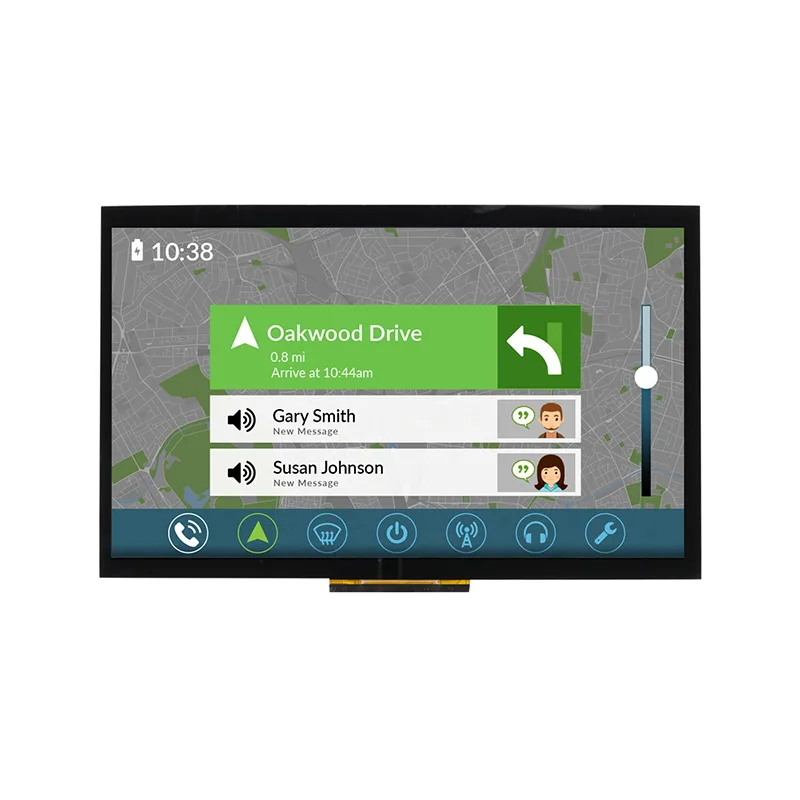How Can High Sensitivity Touch Displays Enhance User Experience and Precision Control
2025-10-23
After working in the display industry for over 20 years, I’ve witnessed how touch technology has evolved from simple single-point panels to advanced high-sensitivity systems. At TF, we take pride in developing cutting-edge Capacitive Touch Screen Module solutions that respond instantly, even to the lightest touch. These displays are built to serve industries where precision, speed, and durability are non-negotiable—from automotive dashboards and industrial controls to smart appliances and medical equipment.
What Makes High Sensitivity Touch Displays Different?
Many customers I talk to struggle with sluggish or inaccurate touch performance, especially in harsh environments or when users wear gloves. High-sensitivity touch displays solve that problem through optimized sensors and smarter signal processing. These displays can detect micro-level touches, water interference, or gloved inputs without lag or false triggers.
Key advantages include:
-
Ultra-responsive operation – Detects even minimal pressure or touch.
-
Glove and water tolerance – Works accurately through protective layers or moisture.
-
Stable performance – Immune to electromagnetic interference and temperature variation.
-
Long lifespan – Designed for continuous use in industrial and outdoor environments.
-
Multi-touch support – Allows gesture control and complex inputs seamlessly.
How Do Our Capacitive Touch Screen Modules Work?
Our modules use projected capacitive (PCAP) technology, meaning multiple electrodes sense tiny electrical changes when a finger or conductive object nears the surface. The controller processes these signals at high speed, providing smooth and accurate touch responses.
Key Technical Highlights:
-
Controller ICs optimized for high-speed scanning and noise immunity.
-
Fine-tuned algorithms for precise tracking of small touch points.
-
Transparent conductive coatings (ITO or metal mesh) ensuring clarity and durability.
-
Optical bonding that enhances visibility and reduces reflection.
What Are the Technical Parameters You Should Know?
Below is an example of the typical parameters we offer at TF for our high-sensitivity touch displays:
| Specification | Typical Value | Description |
|---|---|---|
| Screen Size | 3.5" – 21.5" | Customizable for different devices |
| Touch Type | Projected Capacitive (PCAP) | Multi-touch, high sensitivity |
| Touch Points | Up to 10 points | Supports gesture operations |
| Cover Lens Thickness | 0.7mm – 6mm | Works even with thick glass |
| Interface | USB / I2C / RS232 | Compatible with various systems |
| Surface Hardness | ≥6H | Scratch and wear resistant |
| Operating Temperature | -20°C to +70°C | Suitable for outdoor or industrial use |
| Response Time | ≤8ms | Instant reaction to touch |
| Transparency | ≥90% | Ensures display clarity |
| Glove Touch Support | Yes | Ideal for medical, industrial, or outdoor use |
| Water Resistance | Yes | Works under wet or humid conditions |
| Customization | Logo, shape, color, frame | OEM/ODM available |
Why Should You Choose TF High Sensitivity Displays for Your Project?
From my experience collaborating with OEM clients worldwide, I know that every project has its unique challenges—ranging from EMI noise in factory environments to condensation in outdoor kiosks. That’s why we design every TF Capacitive Touch Screen Module to adapt to your needs, not the other way around.
What sets us apart:
-
Tailored solutions – We support custom sizes, shapes, interfaces, and bonding methods.
-
Industrial-grade reliability – Tested for shock, vibration, and long-term endurance.
-
Crystal-clear visuals – High light transmittance and anti-reflection coatings for superior readability.
-
Stable production quality – ISO-certified factory ensuring consistency batch after batch.
-
Comprehensive support – Our engineers assist from design concept to mass production.
How Can High Sensitivity Touch Displays Improve Your Application?
Let me give a few real-world examples:
-
Automotive systems: Drivers can adjust settings with minimal distraction, even with gloves on.
-
Medical devices: Doctors and nurses benefit from precise touch control under sterile conditions.
-
Industrial control panels: Workers can operate equipment reliably despite dust, moisture, or static.
-
Smart retail kiosks: Customers enjoy faster, smoother interactions.
These displays not only enhance usability but also reduce operational errors, boosting overall system efficiency.
What Factors Should You Consider Before Selecting a Touch Display?
Before choosing your display solution, evaluate:
-
Environment: Will it face high humidity, temperature, or dust?
-
User behavior: Will users wear gloves or have wet hands?
-
Display integration: Is optical bonding required for sunlight readability?
-
Durability: Does the application demand anti-scratch or impact resistance?
-
Interface compatibility: Ensure seamless connection with your device’s control board.
By addressing these factors early, you can extend product lifespan and minimize maintenance costs.
Ready to Experience the Precision of TF High Sensitivity Touch Displays?
If your project demands smooth, reliable, and high-accuracy touch control, we’re here to help. Our Capacitive Touch Screen Module experts at TF can guide you through customization, prototyping, and integration.
Contact us today to discuss your project requirements or request a detailed quotation. Let’s build a touch solution that feels as responsive as your ideas.
